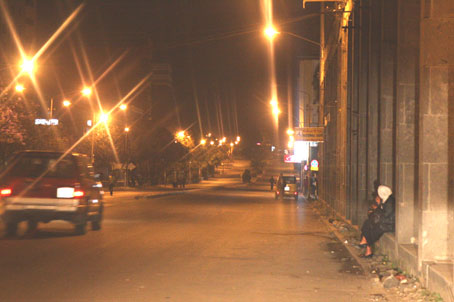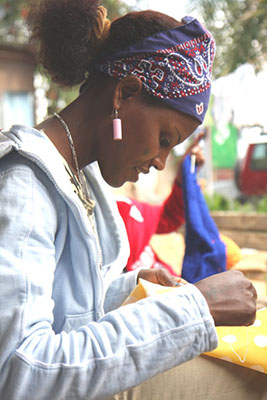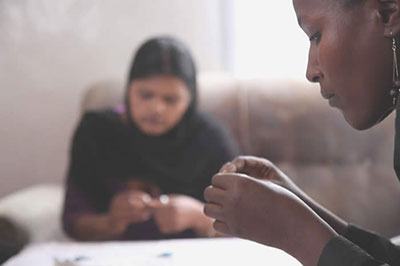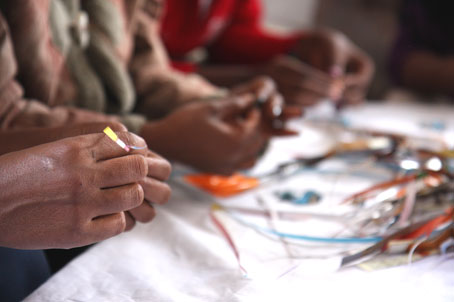 Working across 4 cities, E-WAR provides the means for women to gain meaningful employment and escape the trap of a dangerous lifestyle.
Working across 4 cities, E-WAR provides the means for women to gain meaningful employment and escape the trap of a dangerous lifestyle.
In a country renowned for extreme poverty, E-WAR is not providing ‘charity’ but is equipping women with the skills to go from poverty to prosperity through new employment opportunities. They have the choice of training in a range of areas from food technology, to hairdressing, to soap or scarf making amongst others.
On a continent where HIV/AIDS is at an epidemic level, E-WAR is addressing the needs of a particularly vulnerable group – commercial sex workers – and in so doing is contributing to the reduction of the spread of HIV/AIDS. The project has already replicated itself once, and with the right support should be able to serve other towns and cities in Ethiopia – it could also serve as a model for other nations in Africa.
 CRED and Ellilta-Women at Risk
CRED and Ellilta-Women at Risk
CRED has a long-standing relationship with E-WAR acting as donor, consultant, advisor and friend, and the success of Ellilta-Women At Risk is in no small part due to those who’ve donated to Cred through the years. We’re committed to supporting E-WAR as they continue to develop and grow the work that they’re doing and to that end, Cred is looking to attract additional UK funding from individuals, organisations and agencies to support this innovative project: an indigenous, adaptive & transformative model that has proved its credentials.
An important part of the programme is that of passing on business skills with a view to supporting women set up their own businesses or gain employment relevant to the local market. There have been many success stories, especially within the catering or clothing industries.
In the past, CRED has seed-funded business initiatives alongside E-WAR, including ‘Café Chocolata’. This café delicatessen was aimed at Addis Ababa’s embassy and ex-pat communities and for a number of years was a successful enterprise serving as a valuable training ground for a number of women.
Women now have opportunities to develop their catering and baking skills in a number of different outlets in Addis Ababa that E-WAR has developed apprenticeship relationships with.
One avenue of E-WAR’s business scheme which is currently thriving is their scarf production. A number of women who have completed the rehabilitation programme now hand-make fabulous scarves which are retailed online for sale in the US, through another partner of E-WAR ‘FashionABLE’.

 She had no money and no one to turn to. Orphaned at just 7 years old, she struggled to exist from then on. At 17 years of age, and totally despairing, she turned to the only option that seemed remaining: trading sex for money.
She had no money and no one to turn to. Orphaned at just 7 years old, she struggled to exist from then on. At 17 years of age, and totally despairing, she turned to the only option that seemed remaining: trading sex for money.
The experience was deeply humiliating. “I refuse to call it a life,” she said, recalling her three years as a sex worker in Adwa, Ethiopia. “It was very bad. I have no words to express my bad feelings.”
Her life in Ethiopia’s dangerous sex industry began in a hotel. “I was hit and raped by the owners whenever they wanted,” she recalled tearfully. “I hardly made any money, because they made me pay for the room I used, and I had to give the owners a percentage, so really, all that was left was money for food.”
Unable to save money, and with no other income-generating skills or resources at her disposal, she felt trapped. To make matters worse, given the nature of Ethiopia’s oppressive sex industry and the prevalence of HIV/AIDS, she feared for her life. “I think many people who come to us are sick,” she said, implying that many of her clients probably carried the HIV/AIDS virus. However, thankfully after three years, she found a way to escape the life she hated.
 Ellilta – Women at Risk
Ellilta – Women at Risk
This story is a real one, and belongs to a real person who subsequently found a new life for herself after taking part in an innovative programme run by Ellilta-Women At Risk (E-WAR) in Addis Ababa (Ethiopia).
The premise is simple: most commercial sex workers (CSW) want to escape their way of life. In a 12 month programme combining structured counseling, life-skills and vocational skills training, E-WAR has a 94% success rate for the hundreds of women who have been through their programme so far, each of whom have gone on to employment or running their own business.
The premise may be simple, but the journey for these women is of course a complex one. An holistic approach is required, incorporating counselling, medical services, skills & business training, and general support. Women are given a small monthly income to cover basic living costs, and dependent children are enabled to attend school and access relevant medical services.
The programme, which is over-subscribed due to its popularity, works because it gives opportunity to those who really do want to change.




